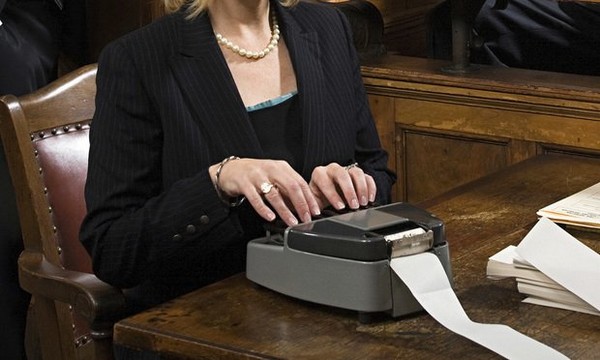
Career as a court reporter
A career as a court reporter or stenographer may not be the first thing that comes to mind when you think of working in the legal field. However, the work of a court reporter forms an essential part of the legal process.
Sense of Purpose
Many people are dissatisfied with their jobs if they feel that what they do doesn’t really matter. As a court reporter, you will sit down to work every day knowing that you are doing something with real significance. You are helping make a record of important events and testimony. You could be an observer of some of the most important moments in people’s lives. In addition, the importance of the work that court reporters do means that this is a field that demands a high degree of professional integrity and respect.
Making use of your strengths
Perhaps one of the most overlooked ingredients in job satisfaction is the feeling of knowing that you are putting your natural skills and talents to their best use. Court reporters can take a lot of pride in how their occupational strengths contribute to a job well done. If you’ve been undervaluing your good memory and fast typing skills, court reporting offers you a place where you can feel proud of your strengths. If you also possess a natural attention to detail, as well as strong writing and editing skills, a career in stenography may make you feel right at home!
Variety of Work
When you work as a court reporter, variety will definitely be the spice of your working life! Phoenix deposition services utilize court reporters to transcribe depositions and testimony in a wide variety of cases. You’ll likely be observing cases that include people from all walks of life and backgrounds. You may come across some fascinating personalities!
Being a court reporter also gives you the opportunity to learn about different fields and terminology. In fact, part of your training will be to prepare for all the legal, technical, and medical jargon you may have to transcribe. While the fundamental aspects of your job duties will remain consistent, no two workdays will be the same!
Flexibility & Structure
Don’t assume that the unique requirements of each case and transcript will mean that your work life will have no structure at all and be completely unpredictable. A court reporter’s job in some ways is the best of both worlds: a lot of flexibility combined with specific guidelines and criteria that provide a consistent foundation for your work.
There will usually be a very clear deadline for when you have to have a complete and edited transcript complete, as well as detailed rules for how particular types of transcriptions must be done.
Where does the flexibility come in? Freelance court reporters can choose which assignments they are willing and able to accept at any given time, allowing you to design the right amount of balance between your career and your other priorities.
In our increasingly networked and interconnected digital world, court reporters and stenographers in some locations have the opportunity to work remotely.
Continued Improvement and Growth
In stenography and court reporting, the “next steps” in your career are often clearer than they might be in other fields. You often have specific technical goals to shoot for, such as increased typing and editing speeds or learning more specialized terminology to make yourself better qualified for specific types of work.
On the professional development front, court reporters often set their sights on obtaining certifications, such as Registered Merit Reporter (RMR) or Certified Realtime Reporter (CRR). Having clear goals that can take you to the next level in your professions is one of the more fulfilling aspects of a career in this field.
By creating precise and detailed records of legal proceedings and evidence, court reporters are part of the strong foundation of our legal system. If you have the right basic skills, combined with the drive and interest to develop them, you could take your place as part of that foundation.
